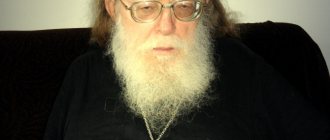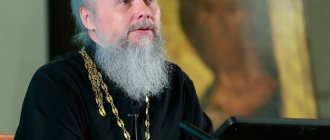On the discussion about teaching psychology in theological schools
Larisa Shekhovtsova
For more than 20 years I have been teaching psychology at the St. Petersburg Theological Academy. All these years I have advocated and actively promoted the idea that psychological knowledge is useful and necessary for clergy. At first, this conviction of mine was met with distrust and doubt, and now, when our correspondence master’s students (the overwhelming majority are priests with solid experience in ministry) write an essay on the topic “The possibility of applying the knowledge of psychology in pastoral ministry,” almost everyone is talking not only about the possibility , but also the need for knowledge of psychology for the pastor.
There is a big question: what knowledge in psychology is necessary for a pastor, what psychology should be taught in theological schools?
Modern psychology today is built on a materialistic foundation, the broadest direction is humanistic psychology, both theoretical and psychotherapeutic practice, but there are also directions developing within the framework of the eastern, occult worldview (transpersonal psychology, positive psychotherapy, the Helenger family constellations that are so popular today), not to mention psychoanalysis.
Although psychology as an academic discipline is included in the curriculum of theological schools, there is no program for teaching psychology approved by the Educational Committee.
On the one hand, it would seem impossible without knowledge of the basics (general psychology), but on the other hand, a priest is not a professional psychologist, and the volume of hours of academic discipline is limited. There were attempts to repeatedly discuss the problems of teaching psychology in theological schools about 10 years ago, but these conversations, as far as I know, did not end in anything. Discussion of this problem is still relevant and requires joint methodological seminars of pastors, psychologists, theologians, anthropologists, and psychotherapists.
There are many problems in teaching psychological knowledge to pastors.
I, as a psychologist who teaches psychology to pastors at a theological academy, am certainly pleased that the rector of Sretensky Seminary understands the importance of knowledge of psychology for pastors.
What does the psychology PROGRAM offered by Sretensky Theological Seminary include in the direction of preparing future pastors “Pastoral Counseling”? In the albeit increased, but still limited volume of the hourly workload of the discipline, is it advisable to general reasoning about Christianity and psychology, the study of the phenomenon of faith in a general psychological sense, instead of practical knowledge of relationships in a modern family?
When our master's students-priests talk about the need for psychological knowledge and its application in their pastoral ministry, they primarily name knowledge of developmental psychology, family psychology, communication psychology, social psychology, pedagogical, that is, they need applied, practical knowledge. For pastors, the need for psychological knowledge is instrumental. Psychology for them is a kind of “tool” that can be usefully used in their work. But what tool? Is every “tool” harmless when it comes to the soul?
And here a lot of theological questions arise!
What is “psyche”: soul or not? Are the concepts “soul” and “psyche” synonymous, or do these concepts have different meanings?
And here we come to ideological questions. Materialist positivists, as is known, believe that the psyche is a function of the brain, something that can be “touched and touched.” Idealist psychologists, namely they who pioneered psychology in Russia at the beginning of the twentieth century (L.M. Lopatin, N.Ya. Grot, N.O. Lossky, G.I. Chelpanov, V.V. Zenkovsky), believed the soul to be immaterial eternal substance and, accordingly, did not see the difference between the “soul” and the “psyche”. Some modern psychologists, who consider the psyche to be a material function of the brain, say that there is also “something”, “immaterial”, “eternal”, and call “this” the soul. In theology, the Christian teaching about man, this “something” is called “spirit”.
“Spirit” is what the priest “works” with! Here there is a line of demarcation between the activities of a pastor and a psychologist. The concern of the shepherd is the spiritual life of the flock, and the “care” of the psychologist is helping a person correct the “deformations” of the soul - mental problems.
This line of demarcation is easier to describe theoretically, but practically how can we draw the line between soul and spirit? How to separate the soul and spirit of a living person? There is no answer to this question in theology! And the shepherd, who must “deal with” the spirit, often deals with the soul - due to the fact that spiritual work is closely linked with spiritual work, and spiritual work with spiritual work. And here a very subtle substitution often occurs: it turns out that the shepherd is forced to solve with his flock not spiritual, but mental, psychological problems (in which he is not always competent), and the psychologist, psychotherapist, for the same reasons, usually solves psychological problems with the person. problems, is forced to look for their roots or healing in spiritual life (where he is also not competent).
Archpriest Vadim Leonov, having experience interacting with psychologists, drew attention to this problem in his article.
In addition, the “instrument of psychology,” as accumulated experience shows, turns out to be a temptation for some pastors: spiritual life requires long and difficult internal work, for which the flock is often not ready. Using technology-tools of psychology, mental problems can be solved faster and easier, but is this solution always valid and not illusory? Does a psychological solution to a problem always contribute to the goal of spiritual growth?
Mental problems can be solved faster and easier. But does a psychological solution to a problem always contribute to the goal of spiritual growth?
As the Western experience of pastors becoming interested in psychology shows, there is a certain desacralization of pastoral counseling through psychology (as noted by Father Vadim Leonov), that is, the replacement of the spiritual with the spiritual.
Here we need very great caution and close interaction between the pastor and a psychologist, preferably with his own experience of spiritual life.
We, Orthodox psychologists in St. Petersburg, see a way out in the development of Orthodox psychology, where the work of an Orthodox psychotherapist is symbolized by a cross: the horizontal of the cross is a solution to psychological problems, and the vertical is an inevitable way out to spiritual issues. A suffering person must be shown that the prospect of solving his mental problems lies in the spiritual space. As Father Vadim accurately notes, the application of psychological knowledge must be corrected by patristic experience.
The temptation that awaits the psychotherapist on this path is not to become a “guru” - a spiritual teacher: “to Caesar what is Caesar’s, and to God what is God’s”!
So, the questions that require the most essential discussion and search for answers when organizing the direction of “Pastoral Counseling” are:
- theological: what is the difference between soul and spirit?
- and psychological: what psychology to teach clergy, how to establish interaction between a pastor and a psychologist, not to mention organizational problems.
The ideal option is cooperation between the pastor and the parish religious psychologist
The ideal option is cooperation between a pastor and a parish religious psychologist, where each does his own thing and each is aware of the direction in which the other is working with a suffering person.
The Diocesan Society of Orthodox Psychologists of St. Petersburg has long been discussing these problems at seminars and annual scientific and practical conferences. You can get acquainted with these materials on the society’s website: www.eopp.spb.ru.
Russian Orthodox Institute of Culture
How often do you hear that Orthodoxy has its own psychologists? What are they like? Probably women in long, dark, shapeless skirts, and if a man, then certainly with a beard and a demeaning look (“I know your sins!”).
This is far from true, and such speculation may be based on the guesswork of a person absolutely far from Orthodoxy.
There really are Orthodox psychologists, and in our country a psychology focused on Eastern Christianity—Orthodox psychology—is currently intensively developing. It is based on the achievements of psychology, Christian philosophy and theology, as well as on the rich heritage of patristic ascetic experience and Orthodox anthropology (the doctrine of man). It is no coincidence that in our time, full of temptations, interest in Orthodox psychology has increased. Orthodoxy itself contains generally accepted spiritual moral values, the need for which is now felt by thousands of our compatriots.
An Orthodox psychologist is, first of all, a specialist with a higher education. There are not many universities in our country (and even in neighboring countries) that offer such a profession. One of them is the Russian Orthodox Institute of Culture. This is not a theological academy or a seminary. RPKI offers training for everyone with at least a secondary education. One of the advantages of the institute is the opportunity to study not only full-time, but also part-time, and even remotely. Therefore, among those studying you can find students from Belarus, the Baltic countries, the Far East, despite the fact that RPIC itself is located in Moscow.
Who are these students?
First of all, they are Orthodox. And don’t confuse them with churchgoers! The degree of churching of all students is very different, among them there are those who have recently begun their journey to faith. First of all, these are people who decided to acquire the profession of psychologist. Professional retraining is obtaining additional professional education. As a result, a Diploma is issued with the right to conduct a new type of professional activity. Students of universities and colleges can study. If a specialist has a psychological education, then for him a yearly refresher course is required.
What does it mean?
This is the improvement of the skills of specialists in connection with the constantly increasing requirements for their qualifications. Only those who already have a diploma of secondary or higher vocational education can pass. A Certificate of Advanced Training is issued. Psychology is a developing science. Behavioral psychotherapy was replaced by psychoanalysis, then humanistic, existential psychotherapy... Nowadays, a spiritually oriented direction is being developed in psychology. Its development is carried out on the basis of various religious and philosophical teachings about man. This direction is reflected in the approach to man within the framework of Orthodox psychology and the understanding of man not only as “body and soul,” but in the recognition of the presence of a higher component of “spirit.” Orthodox psychology takes as its basis the Orthodox worldview and proceeds from the position of Christian anthropology on the understanding of man as the Image and Likeness of God, as the unity of body, soul and spirit.
How does a psychologist train?
In order to become a practicing psychologist, a student needs to undergo not only theoretical, but also practical training. At the first stages, students acquire “client experience”, that is, the student gains experience of undergoing personal therapy in groups in order to resolve their internal personal conflicts and work through their personal problems. Similar group meetings are also held online for distance learning groups, when 6-10 people gather via Internet connection. The participant at such a meeting is forced to face his problems and begin to deal with them.
What is it for?
So that later, when working with clients, a psychologist can provide him with qualified assistance, well, of course, this is his own psychological health. Thus, people who have little awareness and are not ready for personal growth and development get the opportunity for their own development and further learning. Training is based on the principle: theory, practice, error correction. Theory development always takes place in groups of fellow students under the guidance of an experienced teacher-trainer. As a result of training, after completing all the necessary practical hours, passing exams and creative work, there is a chance to receive the coveted certificate and go in search of clients.
What is the advantage of choosing an Orthodox psychologist for personal therapy?
Firstly, unlike secular psychology, Orthodox psychology is based not on 2 centuries of research and the existence of science itself, but on 2,000 years of ascetic and spiritual experience of the Saints and ascetics of the Christian faith, which is undoubtedly much more and undeservedly forgotten during the period of the existence of Soviet power. And this does not mean that the experience of secular psychology is rejected. On the contrary, highly qualified psychologists, gestalt therapists, and psychologists-consultants teach at RPKI, teaching the best practices selected through the prism of the Orthodox approach to man, understanding man as the Image and Likeness of God.
The presence in the curriculum of Orthodox doctrine (Dogmatic Theology), Biblical Studies (Holy Scripture of the Old and New Testaments) and other theological subjects will enrich your personal experience on the path of churching.
Currently, the Faculty of Psychology includes 7 departments: • Orthodox anthropology; • Psychology of religion. • Orthodox and Social psychology; • Parish Psychological Counseling and Psychotherapy; • Methodologies of psychology; • Clinical Psychology; • Developmental and Pedagogical Psychology In addition, the faculty operates: • Scientific and Methodological Center for Orthodox Psychology and Psychotherapy “PROSOPON” • Advanced training courses • Orthodox psychological school “Fundamentals of Orthodox practical psychology”; • Orthodox psychological lecture hall “Patristic psychology and spiritual and moral education.”
The cost of training is fixed and amounts to 30,000 rubles. per academic year (10 months). Payment every month is possible.
Have you decided to receive an Orthodox education?
Then RPIC has the following faculties for you: Orthodox Psychology, Theology, Art History, Cultural Studies. Call the admissions office right now +7-962-995-22-68, free call: 8-800-2222-106, find out more on the RPKI website www.rpik.rf/#rec2582957. Groups are formed throughout the year.
Join the community of Orthodox psychologists!








